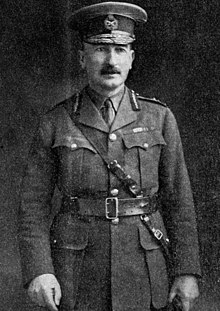Claud Jacob
Sir Claud William Jacob GCB , GCSI , KCMG (born November 21, 1863 in Mahidpur , British India , † June 2, 1948 in London ) was an officer in the British Army and the British Indian Army who achieved the rank of field marshal .
Life
Jacob was born in the Bombay Presidency, the son of officer William Jacob, who rose to the rank of major-general . He attended Sherborne School and the Royal Military Academy Sandhurst before he was accepted as an officer in the Worcestershire Regiment in 1882 . With this he was stationed in India, where he transferred to the Indian Staff Corps in 1884 . In 1886 he became an adjutant in the 30th Regiment (Jacob's) Bombay Infantry and gained his first combat experience in 1890 in the valley of the Zhob on the north-western border of British India . Then he was in the24th (Baluchistan) Regiment Bombay Infantry , in which he was promoted to captain in 1893 . During his 20-year service on the Northwest Frontier, he rose to the rank of Colonel and commanded the Zhob Levy Corps , the 106th Hazara Pioneers, and was most recently General Staff Officer 1st degree on the staff of the Meerut Division .
With the Meerut Division Jacob came to the Western Front of the First World War in 1914, which was deployed at La Bassée from October 1914 . In January 1915 he was promoted to temporary brigadier-general and was given command of the Dehra Dun Brigade of the division with which he took part in the Battle of Neuve-Chapelle in March and in the Battle of Aubers Ridge in May . In September 1915 he became General Officer Commanding of the Meerut Division , with which he took part in the Battle of Loos . After the Indian Corps withdrew from the Western Front, he was given command of the British 21st Division in November 1915 and was promoted to Major-General on January 1, 1916. In March 1916, he was seriously wounded when a German shell hit his divisional headquarters . In September 1916, during the Battle of the Somme , he was given command of the II Corps of the British Reserve Army under Hubert Gough . With his corps he took part in the storming of the Thiepval ridge . In June 1917 he received his substantial promotion to lieutenant-general and was used with his corps in the Third Battle of Flanders in autumn 1917. He kept command of the corps beyond the armistice and took part in the occupation of the Rhineland .
In January 1920 he became Chief of the General Staff of the Commander-in-Chief in India, Henry Rawlinson, 1st Baron Rawlinson , and was promoted to full general in May of that year . From 1924 to 1925 he was Commander-in-Chief of the Indian Northern Command , after the death of Lord Rawlinson in March 1925 he temporarily succeeded him as Commander-in-Chief in India until the Commander-in-Chief William Birdwood, 1st Baron Birdwood, arrived. Jacob then became military secretary of the India Office and held this post until his retirement from active service in 1930. On November 30, 1926, he was promoted to field marshal.
Jacob was constable of the Tower of London from 1938 to 1943 . He was also an honorary colonel in various regiments in the British and Indian armies. Jacob died in 1948 at the age of 84. His son Ian was Lieutenant-General in World War II and Director General of the BBC from 1952 to 1959.
literature
- TA Heathcote: Dictionary of Field Marshals of the British Army. Pen & Sword, 1999.
| predecessor | Office | successor |
|---|---|---|
| Henry Rawlinson, 1st Baron Rawlinson |
Commander in Chief of the British Forces in India 1925 |
William Birdwood, 1st Baron Birdwood |
| personal data | |
|---|---|
| SURNAME | Jacob, Claud |
| ALTERNATIVE NAMES | Jacob, Claud William (full name) |
| BRIEF DESCRIPTION | British Field Marshal |
| DATE OF BIRTH | November 21, 1863 |
| PLACE OF BIRTH | Mahidpur , British India |
| DATE OF DEATH | June 2, 1948 |
| Place of death | London |
